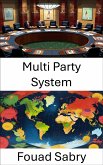In a time of political instability, understanding National Unity Governments is essential. This book, part of the "Political Science" series, provides a detailed examination of how diverse political factions form such governments, focusing on their role in managing crises, maintaining stability, and shaping policy across various political systems.
1: National Unity Government - Introduces the concept, exploring its historical and theoretical foundations.
2: Coalition Government - Explores the mechanisms, advantages, and challenges of coalition governments.
3: Politics of the United Kingdom - Examines the UK’s political landscape and the role of National Unity Governments.
4: Politics of Norway - Analyzes Norway’s political system to offer comparative insights into National Unity Governments.
5: Unionist Party (Canada) - Discusses the Unionist Party’s role in the formation of National Unity Governments.
6: Leader of the Opposition (United Kingdom) - Reviews the influence of the Leader of the Opposition on UK National Unity Governments.
7: National Government (United Kingdom) - Explores the historical significance of the UK’s National Government.
8: Balance of Power (Parliament) - Analyzes parliamentary balance of power and its implications for National Unity Governments.
9: Churchill War Ministry - Discusses Churchill’s war ministry and its role in UK political stability.
10: Churchill Caretaker Ministry - Reviews Churchill’s caretaker ministry and its impact on National Unity Government dynamics.
11: Liberal Party (UK) - Explores the Liberal Party’s role in National Unity Governments.
12: List of Political Parties in Norway - Provides an overview of Norway’s political parties relevant to National Unity Governments.
13: Bonar Law - Discusses Bonar Law’s career and his role in UK National Unity Governments.
14: Minority Government - Analyzes minority governments and their interaction with National Unity Governments.
15: Hung Parliament - Examines the relationship between hung parliaments and National Unity Governments.
16: Grand Coalition - Reviews grand coalitions and their significance within National Unity Governments.
17: United Kingdom General Elections Overview - Provides insights into how UK general elections affect National Unity Governments.
18: Confidence and Supply - Examines confidence and supply agreements supporting National Unity Governments.
19: Coalition Coupon - Discusses the Coalition Coupon system and its implications for National Unity Governments.
20: National Liberal Party (UK, 1922) - Offers a historical look at the National Liberal Party’s role in National Unity Governments.
21: Pentapartito - Explores the Pentapartito system and its influence on National Unity Governments.
1: National Unity Government - Introduces the concept, exploring its historical and theoretical foundations.
2: Coalition Government - Explores the mechanisms, advantages, and challenges of coalition governments.
3: Politics of the United Kingdom - Examines the UK’s political landscape and the role of National Unity Governments.
4: Politics of Norway - Analyzes Norway’s political system to offer comparative insights into National Unity Governments.
5: Unionist Party (Canada) - Discusses the Unionist Party’s role in the formation of National Unity Governments.
6: Leader of the Opposition (United Kingdom) - Reviews the influence of the Leader of the Opposition on UK National Unity Governments.
7: National Government (United Kingdom) - Explores the historical significance of the UK’s National Government.
8: Balance of Power (Parliament) - Analyzes parliamentary balance of power and its implications for National Unity Governments.
9: Churchill War Ministry - Discusses Churchill’s war ministry and its role in UK political stability.
10: Churchill Caretaker Ministry - Reviews Churchill’s caretaker ministry and its impact on National Unity Government dynamics.
11: Liberal Party (UK) - Explores the Liberal Party’s role in National Unity Governments.
12: List of Political Parties in Norway - Provides an overview of Norway’s political parties relevant to National Unity Governments.
13: Bonar Law - Discusses Bonar Law’s career and his role in UK National Unity Governments.
14: Minority Government - Analyzes minority governments and their interaction with National Unity Governments.
15: Hung Parliament - Examines the relationship between hung parliaments and National Unity Governments.
16: Grand Coalition - Reviews grand coalitions and their significance within National Unity Governments.
17: United Kingdom General Elections Overview - Provides insights into how UK general elections affect National Unity Governments.
18: Confidence and Supply - Examines confidence and supply agreements supporting National Unity Governments.
19: Coalition Coupon - Discusses the Coalition Coupon system and its implications for National Unity Governments.
20: National Liberal Party (UK, 1922) - Offers a historical look at the National Liberal Party’s role in National Unity Governments.
21: Pentapartito - Explores the Pentapartito system and its influence on National Unity Governments.








